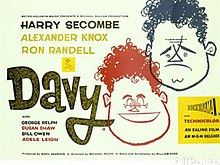Davy (film)
| Davy | |
|---|---|
 British theatrical poster | |
| Directed by | Michael Relph |
| Written by | William Rose |
| Produced by | Basil Dearden |
| Starring | |
| Cinematography | Douglas Slocombe |
| Edited by | Peter Tanner |
Production company | |
| Distributed by | Metro-Goldwyn-Mayer |
Release date |
|
Running time | 83 minutes |
| Country | United Kingdom |
| Language | English |
| Budget | $458,000[1] |
| Box office | $305,000[1] |
Davy is a 1958 British comedy-drama film directed by Michael Relph and starring Harry Secombe, Alexander Knox and Ron Randell.[2] It was the last comedy to be made by Ealing Studios and had the distinction of being the first British film in Technirama.[3] Davy was intended to launch the solo career of Harry Secombe, who was already a popular British radio personality on The Goon Show, but it was only moderately successful.[4]
Secombe said it "was to be my big chance to score a success in films, something I had longed to do ever since I started in the business. My previous attempts at becoming a film star were pretty poor to put it mildly."[5]
Plot[edit]
A young entertainer is conflicted over the chance of a big break. He has to decide whether to remain with his family's music hall act or to go solo.
Main cast[edit]
- Harry Secombe as Davy Morgan
- Alexander Knox as Sir Giles Manning
- Ron Randell as George[6]
- George Relph as Uncle Pat Morgan
- Susan Shaw as Gwen
- Bill Owen as Eric
- Isabel Dean as Miss Helen Carstairs
- Adele Leigh as Joanna Reeves
- Peter Frampton as Tim
- Joan Sims as Tea Lady
- Gladys Henson as Beatrice, Tea Lady
- George Moon as Jerry
- Clarkson Rose as Mrs. Magillicuddy
- Kenneth Connor as Herbie
- Liz Fraser as Tea Lady
- Charles Lamb as Henry
- Arnold Marlé as Mr. Winkler
- Campbell Singer as Stage Doorkeeper
Peter Frampton, who plays young Tim, was the son of Harry Frampton, makeup artist for many years at Ealing including in this film. Peter would eventually follow in his father's footsteps and worked as his assistant on several films, including Hitchcock's Frenzy (1972). In 1995, Peter Frampton won the Oscar for Best Makeup for Braveheart. He remembered his filming on Davy fondly, as "it meant time off school and (getting the) star treatment."[7]
Production[edit]
The film was one of six made by Ealing Studios under an agreement they had with MGM. The National Film Finance Corporation provided £29,849 of the budget of £198,997.[8]
The film was directed by Michael Relph who normally worked as a producer. Relph later said Davy "wasn't very good" an the script by William Rose "wasn’t one of his best."[9] According to Kenneth Tynan who worked for Ealing around this time the movie was the "brainchild" of Rose.[10] Tynan criticised Michael Balcon, head of MGM, for his choice of material on the MGM films. He wrote, "at that stage in your career and at that nadir in the international repute of British films, it might have been worth while to gamble. More worth while, anyway, than making Davy’'."[11]
Reception[edit]
Box office[edit]
According to MGM records, the film earned only $40,000 in the US and Canada and $265,000 elsewhere, resulting (after deduction of distribution costs as well) in a loss to the studio of $279,000. It lost more money than any of the six MGM-Ealing films made in the late 1950s.[1]
Secombe later wrote "part of the reason why Davy failed to impress was the fact that it was billed as a ‘zany’ type movie, overemphasizing the comedy content, whereas it was mostly a dramatic story. Anyway it was not the stepping stone to stardom that I had hoped it would be."[12]
Critical[edit]
Variety called it "an amiable though not sensational pic debut."[13]
TV Guide called the film a "pleasant if unimpressive drama";[14] Britmovie wrote, "stylistically the film is an awkward combination of broad farce, Secombe having made his name as one of the denizens of the celebrated Goon Show, and awkward, turgid scenes of moral conflict";[15] while Allmovie noted, "a stellar supporting cast enables Davy to overcome its occasional banalities and cliches."[16]
References[edit]
- ^ a b c The Eddie Mannix Ledger, Los Angeles: Margaret Herrick Library, Center for Motion Picture Study.
- ^ "Davy". BFI. Archived from the original on 13 January 2009.
- ^ "Davy (1958) - Articles". Turner Classic Movies.
- ^ "Davy (1958) - Notes". Turner Classic Movies.
- ^ Secombe p 61
- ^ Vagg, Stephen (10 August 2019). "Unsung Aussie Actors – Ron Randell: A Top Twenty". Filmink.
- ^ "Davy (1958) - Articles". Turner Classic Movies.
- ^ Harper, Sue (2003). British cinema of the 1950s : the decline of deference. p. 69.
- ^ MacFarlane, Brian (1997). An autobiography of British cinema : as told by the filmmakers and actors who made it. p. 483.
- ^ Tynan, Kenneth (1998). Kenneth Tynan, letters. p. 220.
- ^ Tynan p 222
- ^ Secombe p 65
- ^ Review of film at Variety
- ^ "Davy". TV Guide. Archived from the original on 6 November 2014. Retrieved 5 November 2014.
- ^ "Davy 1957 | Britmovie | Home of British Films". Archived from the original on 6 November 2014. Retrieved 5 November 2014.
- ^ "Davy (1958) - Trailers, Reviews, Synopsis, Showtimes and Cast". AllMovie.
Notes[edit]
- Secombe, Harry (1989). Arias & raspberries : the autobiography of Harry Secombe.
